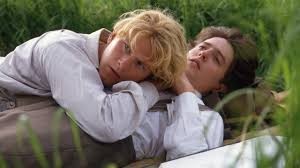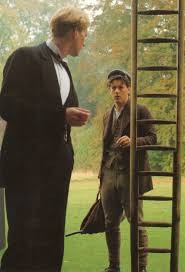a world and time that kills love and dreams
by Douglas Messerli
Kit Hesketh-Harvey and James Ivory
(screenplay, based on E. M. Forster’s Maurice) James Ivory (director) Maurice / 1987
James Ivory’s 1987 film, Maurice (the
name of the work’s cinematic hero, pronounced “Morris”) is certainly one of the
most beautifully filmed gay romances ever committed to celluloid. Even the
costumes captured the attention of the Academy Awards, who chose this film for
its Best Costume Award.
The
acting, particularly that of James Wilby (as Maurice Hall), Hugh Grant (as
Clive Durham) and Rupert Graves (as the stable boy-bay lover of Maur), is
believable and effecting. Moreover, these three leads are all remarkably
beautiful men.
Even minor characters such as Simon Callow (Mr. Ducie), Billie Whitelaw
(Mrs. Hall), Judy Parfitt (Mrs. Durham), and Mark Tandy (as Lord Risley, young
and older) are superbly acted.
And
despite a rather simple narrative—young Cambridge student Clive falls in love
with another student, Maurice, but demands their love remains non-sexual
because, so Clive argues, somewhat inexplicably, it would diminish them both.
Ultimately after a desultory trip to Greece Clive returns to England
determined to break off his love affair with Maurice—particularly after the
arrest and imprisonment of their acquaintance Risley for homosexual
behavior—and return to heterosexuality, in part so that he might marry a rather
clueless and not truly beautiful woman, Anne, he has met in Greece and become
the sole resident with his wife of the country estate Pendaersleigh. In other
words, he chooses wealth, position, and the sexual status-quo of English
society, rather than his true love and sexuality. He is a coward in a world of
such men.
In
the second mirror half of this story, Maurice shaves his moustache—which Clive
has somewhat justifiably dislikes—to become a younger looking and far more
handsome boy. Clive now sports a small black moustache which completely alters
his face, taking away nearly all of Hugh Grant’s natural beauty, if that’s
possible.
Visited by the under-gamekeeper, Alex Scudder, late one night in his
bedroom, Maurice falls desperately in love with the servant, but soon after
fears that he will be black-mailed, particularly when Alex invites him to the
boathouse to talk about ‘something important,’ and later visits him at his
London office at the stock-exchange.
After a fearful few moments, Maurice visits the British Museum with the
handsome boy and discovers that Alex does not want money but respect and
continued love. Maurice rents a hotel room where the couple again have an
evening of satisfying love-making. Unlike the sensuously-based love between
Maurice and Clive, his love with Alex is most definitely carnal and completely
fulfilling to both lovers.
When Alex reminds him that since the very next day we will be traveling
with his brother to Argentina and new job, Maurice insists that he stay. “And
live with your mother?” Alex asks somewhat aghast. Certainly, Maurice could not
continue his job at the stock exchange. “We’re both smart,” insists Maurice, we
can find something else. But even Alex is a bit flabbergasted by his friend’s
fantasies.
When Maurice, carrying a small token of his love, arrives at the boat
that is to take Scudder away, he meets his lower middle-class parents, the
brother, and a minister who carries with him a reference so another minister in
Argentina who will baptize the young sinner.
When Alex does not show up by the time the boat is ready to sail,
Maurice realizes just what Alex has sacrificed for his love, and instinctually
rushes off the Pendersleigh to visit the boathouse where he is sure he will
find Alex waiting.
The
film ends with Clive closing up the house for the night, and another perhaps
not so perfect evening with his sweet but not-brilliant wife. At one window he
pauses for a few moments before closing down the curtain, peering into the
darkness surround Pendersleigh. Yet we can clearly imagine what he is thinking:
about his past love of Maurice and, perhaps, the desperate choices he has made
as opposed to the open possibilities Maurice has created for himself.
If
the plot I have just recounted, in abridged form, seems as if it could be that
of any paperback heterosexual romance, with hunky men and long-haired beauties
attempting to escape the fates, fortunately, the real heart of this film, as
well as Forester’s original novel, remains unspoken, about a love that cannot
be spoken and the inner turmoils of the individuals trapped within its web.
If, at work’s end, everything seems to be somewhat peaceable as the
closing credits rise, we know that Alex’s fears for their future were not at
all insignificant. Just how the happiest couple might now survive is difficult
to imagine. For there are still three major villains waiting in the darkness
into which Clive seems to be peering before heading off to slumber.
We get glimpses of all of these villains throughout the movie, but the
full brunt of their force is not fully revealed in the film itself. The first
of these, obviously, is long list of laws against homosexuality that remained
on the books until 2010 and, for the military, 2016. Beginning with the 1533
Buggery Act, the offences, without the punishment of death, were extended under
the 1961 Offences Against the Person Act of 1861 and The Labouchere Amendment of
1885, the law by which Oscar Wilde was tried. And the 1885 Criminal Law
Amendment extended those previous laws to include any kind of sexual activity
between males, obviously the law through which this film’s Lord Risley was
imprisoned. As late as the 1950s, another Cambridge genius, Alan Turing
received chemical castration (in place of imprisonment) for his gay sexual
actions, and later, it is believed, committed suicide
As
the doctor Maurice temporarily visits to be cured of homosexuality by hypnosis,
advises, when, upon the second visit Maurice reveals he has again had wonderful
sex with Alex and argues that it is simply human nature, “Perhaps you should
move to France or Italy which more openly allow such sexuality. England is a
country which has always been disinclined to accept human nature.”
One
can only imagine the thousands of young men who grew up in a world where that
had been educated in a male-only world, with plenty of opportunity and
sometimes even encouragement to participate in male-on-male sexual
relationships, forced, upon their university or college graduations, to
suddenly move into a new heterosexual space.
For
some like Clive the new reality was gradually accepted, sometimes with secret
exceptions—a trip to the city, a hunting party with friends in the wild, or
frequent trips abroad. For men like Maurice, truly moral beings who longed to
love one person, those choices were quite impossible.
Yet
the final villain, more subtle that these others, is only hinted at by the
director’s decision to literally date his scenes: 1910 The Edwardian Age, etc.
And, later, by all the young women’s attempts to bandage ever nearby male who
they can get their hands on.
I
believe that the last dated scene of this film is 1913. By the next year, World
War I will have broken out, and many of the young men portrayed in this
film—most certainly Maurice and Alex, Clive perhaps to be saved by his position
in the class system—finding themselves in trenches or involved in impossibly
meaningless maneuvers that would kill thousands. One need only remind oneself
of another very handsome Cambridge-educated poet, Rupert Brooke, who was bisexual
and died in 1915; or the gay poet Wilfred Owen, who died in 1918, author of Anthems
for Doomed Youth.
When I began this piece I was going to describe Ivory’s film as a “gay
fantasy,” but the dreams of living together for the rest of their lives in
peace, are not simple fantasies; rather they are sad statements about a society
and time that would squelch and destroy all of their possibilities for love and
dreams.
Los Angeles, June 20, 2020
Reprinted from World Cinema Review (June
2020).






No comments:
Post a Comment